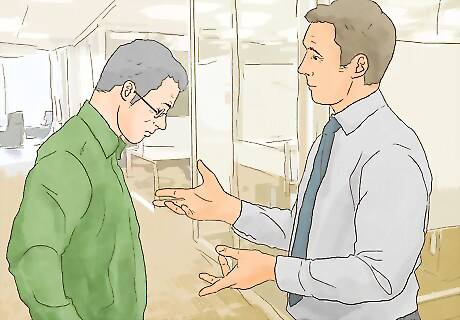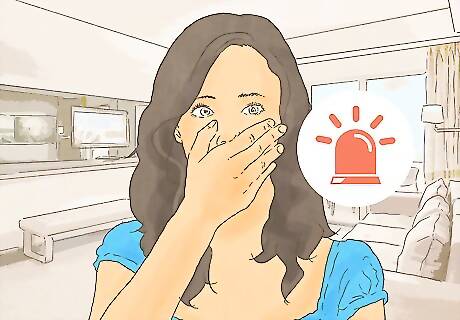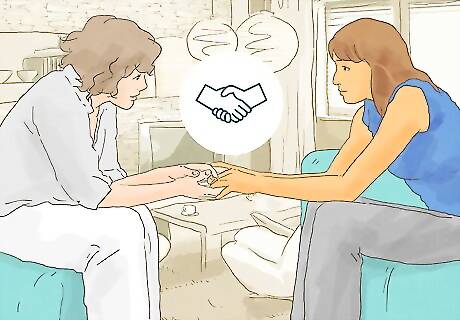
views
Having the Conversation

Get to the point. If you had to initiate the conversation, let the other person know upfront what you want to talk about. Spit it out, even if it’s hard to say. The longer you dance around the point, the harder it will be to bring it up. If you can’t say what you need to without getting visibly flustered, practicing ahead of time can help. For instance, start the conversation by saying, “I want to talk to you about…” or “I think we need to talk about…” You may even start the conversation by explaining that the issue is difficult for you to address. For example, say, “This is challenging for me to talk about, so please bear with me…” It can help to be as impersonal as possible. If you’re discussing an embarrassing problem with the other person, frame the conversation in terms of the problem, not the person causing it.

Use a matter-of-fact tone. Stay as brisk and businesslike as you can – that will help you and the other person both feel less embarrassed. Push your feelings aside for the moment and be straightforward. Try not to fumble for words or make it obvious that you’re uncomfortable. For instance, instead of telling your roommate, “You and your boyfriend really need to tone down the PDA,” say something like, “I want this to be a comfortable place for all of us to live, and all the PDA makes me feel awkward.”

Pause if you need to. Don’t feel like you have to fill up all the silences in the conversation. If you need to, take a moment to breathe, sort out your thoughts, and figure out what to say next. You’re already having an embarrassing conversation, so an awkward silence isn’t going to make things much worse.
State what you want to happen as a result of the conversation. It’s important to tell the other person why you are bringing up the subject. Clearly convey what you hope to happen in the future. For instance, tell your roommate you would appreciate if they would limit PDA to the nonpublic areas of your living space, such as the bedroom.

Remind the person that the situation can happen to anyone. If you’re feeling uncomfortable, the other person probably is, too. They might even feel worse than you do. Ease some of the tension by making the other person feel better, if you can. For instance, if you have to tell someone they have bad breath, follow it up with, “I’m not telling you this to make you uncomfortable, and this is a really common problem for lots of people. I just wanted to make sure you knew.” You can also tell a story about something that happened to yourself or someone else. If you have to let someone know they’ve committed a faux pas, for example, tell them about a time you did something similar.

Use humor. If it’s appropriate, break the tension by making a joke. Poke fun at yourself or the situation. You might say, for example, “Ah, I never imagined a clearer moment when I wished to be swallowed by the floor.” Don’t make fun of the other person, though. That will make the conversation even more awkward.
Managing Your Embarrassment

Realize it's probably not a big deal. Take a deep breath and try to relax. Don’t make a mountain out of a molehill. The conversation may not seem as awkward to the other person as it does to you. Even if the other person is embarrassed too, it’s just one conversation – a month from now, it will be nothing but a blip on the screen. Remember, other people are more focused on their own feelings and problems than on yours. You might feel mortified during this conversation, but depending on what it’s about, the other person might not even think about it after today.

Be honest about how you’re feeling. If your embarrassment is really getting the better of you, call yourself on it. Say something like, “Wow, that felt awkward to say,” or, “This really isn’t my favorite thing to talk about.” Once it’s out in the open, you’ll probably find it easier to keep talking.

Try not to blush. When your face feels like it’s on fire, it’s easy to get even more flustered than you were before. You can prevent yourself from blushing by imagining your hands heating up – it sounds strange, but your mind can actually direct blood into your hands instead of your face. If you can’t prevent yourself from blushing, know that it really isn’t a big deal. Most people aren’t going to judge you for showing embarrassment in an awkward situation.

Focus on what you’re trying to achieve. Keep your mind fixed on the end goal of the conversation. Push your embarrassment aside and work on reaching the resolution you want. Your embarrassment might come flooding back after the fact, but the middle of the conversation isn’t the time for worrying about it. Use grounding exercises to keep you focused on the present moment. Touch each of your fingertips to your thumb, wiggle your toes, focus on your breathing, or find something to focus your visual attention on,

Apologize quickly for inappropriate comments. In some cases, what makes a conversation embarrassing is the fact that you've said something you should probably have kept to yourself. If you engage in word vomit that offends those around you, bounce back by apologizing immediately. Don't act like it didn't happen--you'll only offend the other person more. Instead, say something like, "Wow, that was insensitive. Forgive me" or "Where is my filter today? I'm so sorry."

Remember that silence is normal. Although it may not feel like it in the moment, silence is a completely normal and necessary aspect of communication. Think about the pauses used in written English. Those periods and commas prevent you from taking in too much too fast. A silent pause helps you and the other person process what you just said. Use silence effectively by taking a few deep breaths, in through your nose and out through your mouth. If silence feels completely uncomfortable, just call it out. You might say, "Well, that was an awkward silence!" and laugh it off.
Ending the Conversation

Keep the conversation as short as you can. Don’t drag out an embarrassing conversation for any longer than you have to. Say what you need to say, make sure you and the other person understand each other, and come to a resolution if you need to. Then wrap things up. Don’t be tempted to cut the conversation too short, though. Cover all the points you need to. Otherwise, you might have to have a second conversation later.

Shift topics if the awkwardness is too palpable. Sometimes, continuing an embarrassing conversation requires shifting the topic. If the silence hangs too heavy or either you or the other person are clearly squirming, grant a reprieve. Find a lighter subject to discuss instead. For instance, you might ask the other person, "So, did you catch the game last night?" to change the subject. Alternatively, you could ask the other person if they would rather talk about this some other time.

Excuse yourself. When the conversation is over, go somewhere else. Give yourself and the other person some time and space to recover. Make an excuse if you have to, or just say goodbye and go on your way. For instance, you could say something like, “Well, thanks for talking to me about this. I have to go pick up my kids at school now, so I’ll see you later.”

Avoid dwelling on the conversation afterwards. Find something else to think about when the conversation is over. Don’t replay it in your head or spend the next half hour cringing about how awkward it was. Just take a deep breath, remind yourself that it wasn’t the end of the world, and get on with your day.




















Comments
0 comment